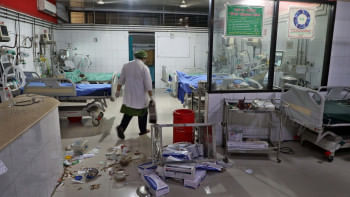We need diverse expertise in the health reform committee

The interim government has recently formed a committee to reform the health system, a commendable initiative given the importance of healthcare to society. However, there is significant concern regarding the committee's composition, which, much like the Covid pandemic management committee before it, is predominantly made up of physicians. This narrow focus on clinical expertise is inadequate for addressing the complexities of the health system.
Health is a social system interconnected with other societal structures such as the economy, politics, and governance, making it far more than a singular component of society. Reforming such a complex system requires a transdisciplinary (TD) approach, which goes beyond multidisciplinary or interdisciplinary methods.
TD integrates expertise across various disciplines and includes input from non-academic stakeholders like policymakers, practitioners, and the community. This approach fosters collaboration that co-creates practical solutions grounded in real-world contexts.
The formation of the health reform committee raises concerns due to the overrepresentation of individuals from a specific discipline, namely physicians and clinicians, many of whom have administrative and leadership experience. However, this approach overlooks the crucial contributions of other core disciplines vital to health services, such as pharmacy, health technology, clinical psychology, public health sciences, data sciences, and medical sociology. Mental health, in particular, is underemphasised, as professionals like clinical psychologists—who play an essential role in mental health care—are not included.
The committee's composition could have been more balanced by involving not only those directly engaged in health services, but also academics from diverse fields who are key to understanding the broader health system. This includes public health experts, data scientists, health system analysts, biotechnicians, economists, sociologists, and psychologists. Importantly, a TD approach should also involve perspectives from outside academia, considering that a health system is a complex social structure—opinions and perspectives from other key stakeholders are also crucial and should be carefully considered.
Furthermore, the committee has overlooked tens of thousands of people who rely on alternative medicine systems like Ayurveda, Unani, and homeopathy. These systems play a significant role in the healthcare-seeking behaviours of marginalised populations in Bangladesh. Excluding their perspectives undermines the potential for creating a sustainable, equitable health system that meets the needs of the entire population.
Pharmacy, pharmaceutical sciences, and public health are integral components of the healthcare sector, yet they have been completely overlooked in the formation of this committee. From a healthcare perspective, the exclusion of industrial pharmacists and clinical pharmacists makes the formation of a committee solely composed of physicians both irrational and exclusionary. Without the involvement of pharmacists, essential functions like proper and effective drug delivery, rational drug use, and the management of drug-related issues—including adverse drug reactions and contraindications—cannot be effectively carried out.
On October 17, the interim government announced the formation of a health commission, chaired by Professor Dr AK Azad Khan. It was also stated that the remaining members of the commission would be announced within 7-10 days. We hope the government's health adviser recognises that meaningful reform in the health sector requires expertise and input from professionals across various disciplines. Since in the previously formed health reform committee, only doctors and clinicians were included, when determining the members of the health commission, the government should move beyond this narrow approach and adopt the proposed TD approach.
Some have questioned whether it is feasible to recruit hospital pharmacists and clinical pharmacists under the current pharmacy curriculum. To them, we emphasise that the reform process will be structured into short-term, mid-term, and long-term phases. In the short term, necessary adjustments will be made to the curriculum. In the mid-term, job opportunities for hospital pharmacists and clinical pharmacists will be created. In the long term, these professionals will be recruited in hospitals across the entire country.
It is impossible to reform the healthcare sector without simultaneously addressing the pharmaceutical sector. The development of a new drug policy, aligned with the national health policy, is essential. Urgent steps must be taken to draft a modern drug policy, reform the outdated 1982 drug policy, and investigate the reasons behind multinational companies withdrawing from the pharmaceutical sector.
Additionally, creating a favourable environment to attract investment from multinational companies and restoring opportunities for knowledge, skills, and technology transfer is crucial. Efforts must also focus on curbing corruption in the drug sector, keeping drug prices affordable, preventing the production of counterfeit, adulterated, and substandard drugs, and ensuring drug quality through a comprehensive overhaul of the Directorate General of Drug Administration (DGDA). To achieve these reforms, the reform commission on health affairs should include at least two senior pharmacists and two faculty experts in pharmaceutical sciences.
The improvement and reform of the pharmaceutical industry is a critical element of the overall healthcare system. If affordable and quality medicines are not made available, the healthcare system will inevitably collapse. Furthermore, if hospital pharmacists and clinical pharmacists are not adequately employed across all hospitals, patients will continue to be deprived of essential pharmaceutical services. We, therefore, urgently request the inclusion of pharmacists and pharmacy faculty representatives in the health reform commission to ensure a comprehensive and effective approach to healthcare reform.
Zobaer Al Mahmud is associate professor in the Department of Clinical Pharmacy and Pharmacology at Dhaka University.
Tauhid Khan is associate professor in the Department of Sociology at Jagannath University.
Views expressed in this article are the author's own.
Follow The Daily Star Opinion on Facebook for the latest opinions, commentaries and analyses by experts and professionals. To contribute your article or letter to The Daily Star Opinion, see our guidelines for submission.

 For all latest news, follow The Daily Star's Google News channel.
For all latest news, follow The Daily Star's Google News channel. 






Comments